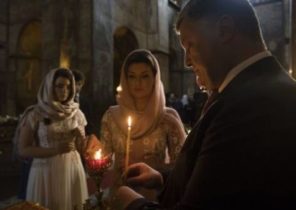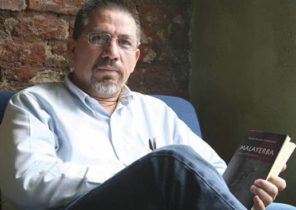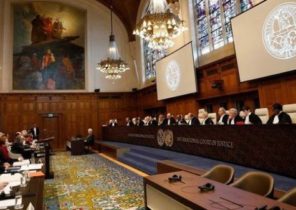
On the outskirts of St. Petersburg on a quiet street with a strange name Hare travel costs residential four-story building made of grey concrete. Building from the Soviet era carries the cumbersome title of a Psychoneurological boarding school № 3, abbreviated PNI 3. For many residents of the surrounding prefabricated houses is more accustomed to a different name, they call him Crazy.
This concrete block inhabited by as many people as possible to live in the village of medium size. The rooms along the long corridors, calculated each six beds, living 1080.
One of them was Alexander Medvedev, whom everybody just calls Sasha.
“This is my first childhood memory: I was five or six years old, and I live in an orphanage. I saw a dream that can run. I Wake up, I want to get up and fall. I ask why, and someone tells me that I can’t run. I asked why, and someone says to me, you’re born that way”.
Before Sasha at the age of 18 years was transferred to the STUMPS, he lived in an orphanage. His friends there told each other scary stories about the house for adults STUMPS. Most of these stories were true.
In Russia, more than 500 such institutions. There are 148 lives of thousands of adults with disabilities, the mentally ill; but there are also elderly who have decided to move from loneliness and despair. Most of these closed institutions were built in the sixties on the outskirts of cities. They are carefully hidden from public view.
These places open very slowly. But life within the walls of the STUMPS № 3 shows that Russian society after seven decades of collectivism, too, begins to move slowly towards the center: stopping often, sometimes reluctantly. But progress, nevertheless, noticeable.
When, in 2001, fellow of the German-Russian Association “Perspektiva” was first started in hare passage, to the hundreds of tenants here had one toilet, and one room can live up to 20 people. Now there are still six people.
Residents of the block eat from tin bowls, many could not even get out of bed. If any of them died, it was sneaking through the long corridors on the ramp of the back entrance and then down low in the basement, in the room of corpses. Residents called it “the chocolate house”. For many of them death seemed sweet in comparison with the everyday life of the institution.
But the transformation began.
Sasha, despite the circumstances, optimist
On the feet of Sasha, who refuse to wear it, is a laptop. In it, he writes of the complaint, which seeks the authorities respect for the rights of their neighbors around the school.
He finishes his appeal to the head of the authority with a request to “do everything possible”, for example, to check, replaced if the city finally, the sidewalk in front of the orphanage, so that people in wheelchairs could use it.
The first response to the appeal of Sasha was written in polite terms, but the content was sobering: the city was reported “dear Alexander Andreyevich Medvedev,” that, unfortunately, the planning of street construction completed, the restructuring hare fare not available “until 2022, inclusive”. Sasha insisted. The last message was much more positive: 2017 next to the roadway to be paved additional pavement.
Sasha — a man who does not lose hope, though, and grew up in difficult conditions. The society in which he was born, was not particularly engaged by men such as he. After the collapse of the Soviet Union, 32% of Russians believed that it was better to “eliminate people like it, or to isolate them from society.”
When Sasha was born a quarter century ago, his brain for one minute not getting enough oxygen. This has led to “mental retardation average degree” and “infantile cerebral paralysis”, that is, to dysfunction of movement. So the doctors wrote in its documents. The mother abandoned him.
Friends call him “the diplomat”
Before the fall of the “iron curtain” Russian parents after the birth of a child with a disability was usually rejected him. For these children in Russia has its own term — the “refuseniks”. The cause of failure was sometimes the plight of the family, the absence of elevators in buildings or the insistence of the doctors.
The inhabitants of the STUMPS Sasha elected Chairman of the Board of residents. His friends gave him the nickname “the diplomat”. He says he often takes two steps forward and then one back. Unfortunately, usually the opposite is happening, one step forward and two back.
The condo Board has only Advisory functions and no power, but thanks to the diplomatic skills of Sasha, the Council had the opportunity to have some influence. One of the most pressing problems of the inhabitants of the institution was the Elevator. Most boarding schools today are private institutions. Tenants have the right to leave them only with special passes administration.
At STUMPS № 3 on the street called Hare passage, all wards of the Association “Perspective” in principle free to leave the territory and return when it suits them. But the living areas are on the upper floors, elevators for wheelchairs are serviced dissatisfied with Elevator only until 17 hours. Residents asked for an extension, the school referred to the lack of funding. Sasha managed to negotiate a compromise. Those who return late, on a mobile phone to call the Elevator.
“Even a person with a disability has the right to stupidity”
Sasha strives to spread the model of Council tenants to other boarding schools. Once a month Association “Perspective” invites him to exchange views. Then Sasha wears a white shirt with a collar. Sit beside him, activists, lawyers and representatives of the residents of the orphanage. On the contrary they occupy the place of Director of PIN and staff of urban management.
Lawyers Association advocate to the residents to dispose of their savings. Yet they don’t even have the right to buy “a few bottles of Coca-Cola for his friends.” The leaders of the orphanage refer to the fact that their players are absolutely not able to handle money. They would “waste all the money on coke”. Female lawyer abruptly agrees and says that “people with disabilities should have the right to stupidity”. One of the Directors of PNI said with a sigh that he had the impression “that the next time our players will want to fly into space”.
Directors and employees of the doubt because activists sometimes speak too rapidly. Disputes break out as because of big problems and small, we are talking about principles. Some want to have as much freedom as possible, and the heads of institutions do not want to deal with the risks and experiments. They made a career in the institutions where a good Manager is the one who best could pretend he’s at work no problem. If the head of any boarding school complains of the disadvantage he risks to surprise inspections. Those who permit some freedom, you begin to blame the fact that they lost control.
“I decided to take my life into my own hands”
Sasha STUMPS in No. 3 on the hare travel at night, charge up the batteries of his electric wheelchair and in the morning went to the center of St. Petersburg, which is 30 kilometers from the internat. It’s 15 minutes in the stroller on a Rabbit’s passage, 20 minutes to new bus with a lift for wheelchairs and, finally, half an hour away on the train, the rattling of the Russian commuter train. If society does not come to him, he should go to society, so says Sasha.
Sasha almost always alone in their journeys. He wants to avoid the impression that it depends on the maintainer: “I decided to take my life in my hands.” Where it lacks own hands, for example, on stairs, he asks for help of passers-by.
However, he meets the surprised looks. But trying to ignore them and not to show his agitation. “You need to calmly communicate with people,” says Sasha. “If you’re scared, they feel it and fear for you. You should not be fear.” Those who behaves hesitantly, he explains how to move his wheelchair using the curb or down the stairs. The metro ride is a challenge. Petersburg is located at the mouth of the Neva river in a swampy area, so the depths of the underground here is one of the largest in the world. The escalators here are steep and length up to 140 meters.
The city built a yellow platform that can transport wheelchairs on escalators. But these platforms need to serve employees of the metro. When Sasha first appeared in front of the escalator, he was told that his trip to the city very dangerous. Platform it, of course, will be given if he will come next time with a guide. Then Sasha every morning, went to the same subway station without an attendant and asked him a yellow platform. “Small war,” as he calls his tactics of warfare of attrition. Within three weeks of the employees of the metro forced him to retreat, then got tired of them. Now they are already ready when Sasha appears away in his wheelchair.
New boarding schools, fewer tenants, more support for parents
The people of Russia have become more relaxed in contacts with people, the existence of which bona larger part of the population a quarter of a century ago knew almost nothing. Today, every second citizen of Russia has nothing against, if the class along with their child learning and children with disabilities; once this was against only 5%. During the polls always ask the question, does anyone that people with disabilities better to “eliminate” or to “isolate” them from society. In 2015, both of which received respectively 2% and 4%, is not taken into account.
The authorities of St. Petersburg announced at the time that the house STUMPS will gradually close. Instead, they must be small family-type homes, where they will live 50 to 75 people, officials say.
The city began to invest in after school programs. Children with disabilities spend time while parents are at work. Parents who can now live with a disabled child, no longer need as before, to give her child to the orphanage for the sole reason that they have no opportunity to feed other family members. The city has significantly increased financial support, St.-Petersburg per month paid 12 thousand rubles, about 200 euros. That’s a lot when you consider that the average income is 43 thousand rubles.
Sasha wants to leave
Sasha opened the account at Sberbank, the largest Bank of Russia, and applied for obtaining the Bank card. He goes shopping at the supermarket, visiting friends in the city for three months, he attended computer courses. He really wants to “develop new skills”. With each new overcome the barrier expands his horizon. He dreams one day to move out of the STUMPS and leave the system, which was born.
Years were as follows: one who enters into such a boarding school, leaving him only with death. Catherine, a lawyer of the Association “Perspective”, together with Sasha looking to get out of this system.
There are examples of residents who left PIN; Sasha would be the first of them with great mental disability and in a wheelchair. The authorities are afraid of this. The city rejected his appeal, together with Catherine, because the management of the orphanage in his characterization wrote that Sasha is not ready for this. He puts very high demands, he has little experience in handling money, he’s in danger of being deceived at the first meeting with the scammers. This information causes irritation of Sasha in the orphanage no one has ever trained with him such issues. He twice sent a complaint against this decision and both times lost.
Sasha continues to print the letters on your laptop. He quickly tries to forget every negative message, as a transitional stage on the way to his goal: his own apartment.
In Peterhof, a few miles from the orphanage, opened a “training room”. At the four tenants of the boarding pass here exercise independent life in which they should be able to cook, make purchases, store money, this project is “Prospects”. The city helped to find a sponsor who pays the rent.
Training lasts for three months. If all goes well, graduating at the end receive a certificate that confirms their ability to live outside of the orphanage. Sasha joined the queue. He was excited, scared, his left hand drying can be a problem. It is difficult to keep this hand on the lid of the pan or to grab a Cup.
So he began to train.
The author met with Alexander Medvedev in 2001-2002 during his civil service in one Russian orphanage. More information about psycho-neurological boarding school № 3 and the work of the Association “Perspective” you will find at www.perspektiven-verein.de.







